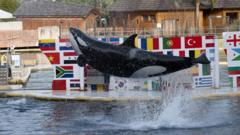In the wake of the recent closure of Marineland Antibes, located near Cannes, France, the future of its two killer whales - Wikie and her young son Keijo - hangs in the balance. This permanent shutdown results from newly enacted animal welfare legislation in France, which prohibits the performance of dolphins and whales in marine parks, a measure born from years of campaign advocacy for the rights of cetaceans.
Marineland, regarded as Europe’s largest marine zoo, announced its closure on January 5, stating that performances featuring orcas and dolphins account for the majority of its visitors—about 90%—thus making the operation financially unfeasible without these shows. The legislative changes come after a long history of scrutiny over the treatment of marine mammals in captivity, particularly following incidents like the infamous story of Tilikum, an orca involved in trainer deaths at SeaWorld.
The disagreement surrounding Wikie and Keijo's future reflects a broader conflict within animal welfare circles. While the zoo's management has proposed relocating the dolphins to a marine facility in Japan, this plan faced strong opposition from animal rights activists. Concerns arise from the comparatively lower welfare standards in Japan and the stress related to long-distance travel. The French government intervened in November, rejecting the proposal, urging for a more humane rehoming solution.
Currently, options for the whales include a sanctuary located off the coast of Nova Scotia, Canada, backed by The Whale Sanctuary Project, which aims to provide an environment more suited to their needs than traditional zoos. Activists argue that relocating the whales to another performance venue, even one that meets European welfare standards, would perpetuate a cycle of exploitation.
Experts in marine biology warn against simply releasing orcas into the wild, as these creatures lack the skills necessary to thrive in their natural habitat since they have spent their entire lives in captivity. As one campaigner put it, proposing to release them is akin to taking a domesticated animal and abandoning it in the wilderness.
Despite the emotional arguments made by activists, including high-profile figures like Pamela Anderson, skeptics question whether alternatives like sanctuaries truly address the complexities of animals accustomed to human companionship. The dynamic realities of their world raise profound inquiries into how society navigates the intersection of wildlife conservation, animal rights, and public entertainment.
The future of Wikie and Keijo remains uncertain, illustrating the pressing need for thoughtful dialogue on the treatment of captive marine life and the search for sustainable solutions for creatures that have long been reliant on human care. As awareness grows towards animal welfare, society faces significant decisions about how to care for and respect the lives of these sensitive marine beings moving forward.
Marineland, regarded as Europe’s largest marine zoo, announced its closure on January 5, stating that performances featuring orcas and dolphins account for the majority of its visitors—about 90%—thus making the operation financially unfeasible without these shows. The legislative changes come after a long history of scrutiny over the treatment of marine mammals in captivity, particularly following incidents like the infamous story of Tilikum, an orca involved in trainer deaths at SeaWorld.
The disagreement surrounding Wikie and Keijo's future reflects a broader conflict within animal welfare circles. While the zoo's management has proposed relocating the dolphins to a marine facility in Japan, this plan faced strong opposition from animal rights activists. Concerns arise from the comparatively lower welfare standards in Japan and the stress related to long-distance travel. The French government intervened in November, rejecting the proposal, urging for a more humane rehoming solution.
Currently, options for the whales include a sanctuary located off the coast of Nova Scotia, Canada, backed by The Whale Sanctuary Project, which aims to provide an environment more suited to their needs than traditional zoos. Activists argue that relocating the whales to another performance venue, even one that meets European welfare standards, would perpetuate a cycle of exploitation.
Experts in marine biology warn against simply releasing orcas into the wild, as these creatures lack the skills necessary to thrive in their natural habitat since they have spent their entire lives in captivity. As one campaigner put it, proposing to release them is akin to taking a domesticated animal and abandoning it in the wilderness.
Despite the emotional arguments made by activists, including high-profile figures like Pamela Anderson, skeptics question whether alternatives like sanctuaries truly address the complexities of animals accustomed to human companionship. The dynamic realities of their world raise profound inquiries into how society navigates the intersection of wildlife conservation, animal rights, and public entertainment.
The future of Wikie and Keijo remains uncertain, illustrating the pressing need for thoughtful dialogue on the treatment of captive marine life and the search for sustainable solutions for creatures that have long been reliant on human care. As awareness grows towards animal welfare, society faces significant decisions about how to care for and respect the lives of these sensitive marine beings moving forward.




















